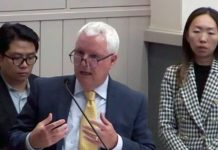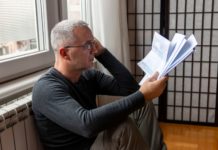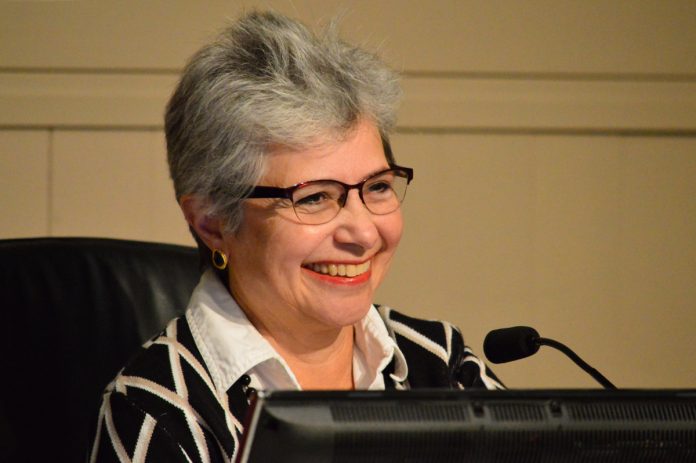In a small city such as South Pasadena, “the position of mayor is overrated,” says 5th District Council Member Diana Mahmud, who was selected by her Council colleagues last month to serve as South Pasadena mayor during 2021. Along with her priorities for the year and assessment of her role as mayor, Mahmud also offered her first detailed public comments on the turmoil last year that centered on the former city manager.
The mayor runs meetings, makes appointments to the city’s commissions, and is “the face of the city. You’re first among equals, [but] it’s really not that big a deal,” Mahmud explains. The amount of work the mayor does is only “marginally” more than that of council members, who each receive $300 month. That’s not to understate how much work the five council members do. Only this week, Mahmud assigned each to serve as liaison to no fewer than three of the city’s 22 standing or ad hoc committees and dozen-plus regional boards.
Mahmud, first elected in 2013, also served as South Pasadena mayor in 2015. So much has happened since then, it takes her a moment to consider her most important accomplishments. “Meetings were run very efficiently,” she says. Having spent most of her career in the legal departments of local government — the Metropolitan Water District, LA Department of Water & Power and the LA District Attorney — “I know how things should be done. I try to bring a level of professionalism to the city.”
After another moment, she says it is commission appointments of which she is most proud. Some, including Mark Gallatin — now chair of the Cultural Heritage Commission, and Janet Braun, chair of the Planning Commission — “have become stars in their own right” she beams.
As for the challenges ahead, “we have too many.” But she has a list.
1) Hiring “a good city manager who will be respected by our residents. The city has been unstable,” not only because of the departure of former City Manager Stephanie DeWolfe, but of other personnel who’ve moved to greener pastures. The city has implemented new benefits like every other Friday off, but other cities have adopted the same approach. “That is definitely a problem.” The city can also leverage the opportunities smaller cities have for greater job authority, as this fits well with millennials’ professed preference for “better quality of life” over compensation, she notes. “Being treated with respect by residents also goes a long way,” she adds.
2) The city needs to “get its financial house in order,” having been without a budget for over six months. She said a 2020-21 budget, as well as the city’s 2019-20 Comprehensive Annual Financial Report, are both slated to emerge in January or February, which will be only a couple months before the city would normally commence work on its 2021-22 budget. Still, “during my term, the city council has been very prudent with the use of city money.” But the Finance Department has been bogged down trying to clean up “literally years” of in appropriate accounting practices that the city disclosed for the first-time last summer and must finish before it can commence work on the budget.
3) Approval of the General Plan update with its state-mandated Housing Element component. Mahmud said she’s proud of having pushed for the update, which got underway in 2016, and says it is something “we are in desperately in need of.” It would have been preferable, she concedes, to have had the General Plan in place this past year as the city approved three large mixed-use developments with a total of 184 units in or near downtown, but believes the developments were nevertheless good projects.
The update “will definitely get done toward the middle of the year.” But that depends in part on the completion of the Plan’s Housing Element, which in turn is informed by the 2,062 mostly affordable housing units for which the city has been required by the state to plan. The city recently lost an administrative appeal to have the figure reduced.
Although the city has strong constituencies both for and against an increase in affordable housing, Mahmud said if there is a plausible legal theory to challenge the state’s allocation, she’ll support doing so. The matter is set to be discussed soon at a closed meeting of the Southern California Association of Governments.
“It is just ridiculous to anticipate that a fully built out city such as ours, that could only accommodate new housing by way of infill, can achieve a 20 percent increase over eight years.”
Mahmud is confident the General Plan will also have an inclusionary housing ordinance requiring new developments to include a small percentage of affordable units. But state and federal governments have not done enough to help local governments fund affordable housing projects, she says, having overseen a decades-long decline stretching back to the Reagan Administration’s tax cuts and Gov. Brown’s termination of the state’s redevelopment agencies.
4) Transportation. There are number of transportation projects in the hopper and a need to continue paving streets that are in “a state of disrepair.” She wants to find ways to make Fremont and Meridian Aves “more habitable places to live” and “to discourage vehicular traffic.”
5) Continuing to push Caltrans to sell the houses it still owns in town–another potential source of affordable housing. Only a few Caltrans homes have been sold, and the process has been complicated by litigation over the prices to be charged for them and more recently by the presence of squatters in the homes.
Mahmud said getting Caltrans to act is “like banging one’s head against a wall.” As for why the agency is so sclerotic, she speculates it’s because responsibility is exercised jointly by Sacramento and Caltrans’ Region 7 in Los Angeles.
6) Economic Development. The city is trying to help with marketing to keep the city’s businesses afloat through spring when, according to a UCLA Anderson School forecast, the nation’s quarterly economic growth rate is projected to hit 6 percent. “We need to have people be employed before we can restore economic health.” Two of the recently approved developments — Mission Bell and Seven Patios — are slated to have new retail space, she notes.
However more is needed, including an enhancement to the city’s tax base. She has no specific tax strategy in mind but noted the city has engaged economic development consultants who’ve come up with various ideas, including a moderately successful effort to make the city a destination for home goods and design.
In connection with this, she notes the pandemic has had “a profound impact on society and the way we live,” with long term effects that may include people working more hours from home. That, combined with the new housing developments and higher residential density zoning, may allow city restaurants to expand mid-day operating hours. Sales tax revenue from restaurants and hotels brought in $140,000 during the second quarter of 2019, but only $80,000 for the same period in 2020, the city reports.
7) Another priority is “working with tenants and apartment owners to achieve a resolution of claims and disputes in a fair and equitable manner.” Some apartment owners have done things that were “fundamentally unfair to long term residents,” she said, citing an instance in which a now-deceased landlord had an “implicit bargain” under which he made no investments in upkeep while incentivizing residents not to complain by keeping rents low. “People should live in habitable, safe conditions and if it takes the imposition of a code enforcement,” then so be it. She hopes the Council will take that issue on this year.
Meantime on Wednesday, the Council made permanent an ordinance that requires landlords seeking to evict tenants because of alleged substantial remodeling work to obtain a permit for the work prior to giving notice of eviction and to take other steps.
8) Mahmud said another priority is initiation of a regional mobile mental health crisis response unit, for which she said funds may be available later this year through Measure J. Police Chief Brian Solinsky gave a report Wednesday, saying both the county and San Gabriel Valley Council of Governments are working on such a program, and that the city is on the COG’s steering committee. The plan is not to involve law enforcement except in the rare cases when a two-person team of mental health professionals responding to a call deems their assistance necessary.
***
Last year was a “tough year to be an elected” official in South Pasadena, Mahmud said. The pandemic “may have magnified people’s unhappiness but obviously there were some root issues we needed to address, did address, and are still in the process of addressing.”
Most notably, she said, was “the turmoil regarding” former City Manager Stephanie DeWolfe. “She really become a flashpoint for controversy. I think the city was in worse shape than we knew” when DeWolfe was hired in fall of 2017, she said.
“Stephanie tried very hard to improve the city’s departments. My own personal feeling is she thought if she did a good job and improved performance of the departments, that would be sufficient. I don’t think she understood that, particularly in a small town such as South Pasadena, how important it is to be responsive to residents’ concerns and complaints.”
While saying she has no direct knowledge, Mahmud said DeWolfe “may have created a difficult work atmosphere for some employees. I have heard some things I won’t repeat but that are of concern regarding the working environment that existed.” Perhaps in trying so hard to improve conditions in the city, she was “too demanding” on staff.
There was no question but that the Finance and Planning Departments “needed work,” the Mayor said. When the Council directed the transfer of various funds between accounts, the accounts were not being updated accordingly. Hence there was “an awful lot of catching up to do that had not been done, and that went back years and years and years.” She said the failure to update accounts began prior to DeWolfe’s hiring and “continued until we discovered” what was going on.
Mahmud said she does not recall how that discovery was made, nor whether it was before or after the confidential CityGate or Claro Group reports that the city did not release until two years later, after questions were raised last summer by parties outside the city.
DeWolfe brought a fresh perspective, Mahmud said, for example to the Planning Department, which had yet to digitalize its services. But Mahmud acknowledged DeWolfe was also in charge when, like a number of other cities, South Pasadena failed to submit paperwork that could have reduced the size of the city’s housing planning mandate. DeWolfe hired an interim planning manager and may have kept him longer than she should have, Mahmud said, “but Planning eventually got some good people.”
Mahmud said it may be that neither Finance nor Planning have sufficient staffing. The Mayor asked the Interim Assistant City Manager about that and in December, the interim city manager reported no additional staffing was needed in Finance. The city also passed an ordinance giving developers the ability to fund the city’s hiring of personnel needed to process their entitlement permits.
The Mayor said DeWolfe was in “a more difficult position than is understood by our residents,” in part because her predecessor, Sergio Gonzalez was “very personable. Sergio was warm and fuzzy. Stephanie was not.”
Ultimately, Mahmud said DeWolfe “realized she had become a lightning rod and was concerned with the extent to which the controversy concerning her would have an adverse effect on city personnel.”
Cognizant of a similar well of opposition from both on and off the city council towards the city’s contract attorney Teresa Highsmith, Mahmud noted Highsmith’s law firm is “one of the most highly respect public law firms in the state. I think very highly of City Attorney Highsmith. She gets pulled in a lot of different directions, but I think the city has been well-served by her.”
The council has been reviewing Highsmith’s performance during two recent closed sessions. But Council Member Evelyn Zneimer’s January 20 motion to withhold payment of Highsmith’s most recent monthly billing for $32,885.75 for December was not seconded.
Mahmud said what gives her hope is the “city’s resiliency.” Citizens “really do care about the city,” and their disagreements, while at times very strong, are “genuine, earnest and come from the heart.”
Mahmud too has been the subject of controversy but is philosophical. “I just try to do my job as best I can. There’s going to be people who disagree with your decisions. You move on. I have no agenda or aspirations for higher office. My objective, and the reason I ran for City Council in the first place, is I feel I’m in a unique position having spent my entire career in local government. I understand how it works. I know how things should be done. I just try to do what I can to achieve results that I think are best for the city.”



















.png)










